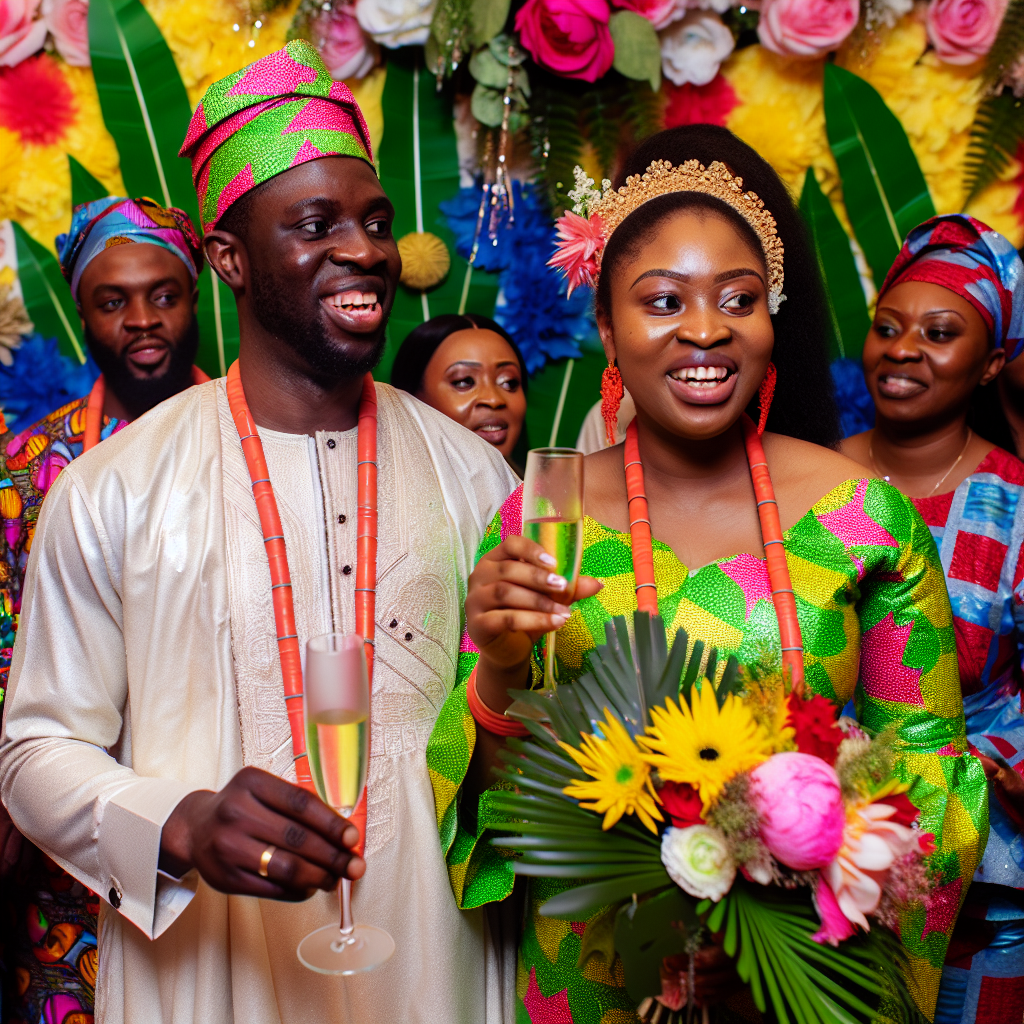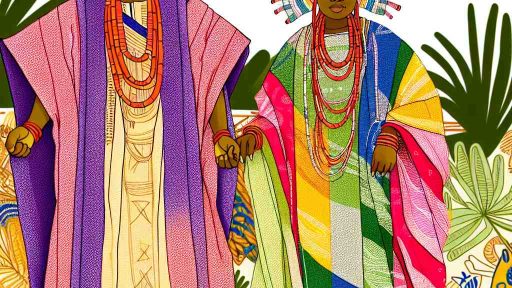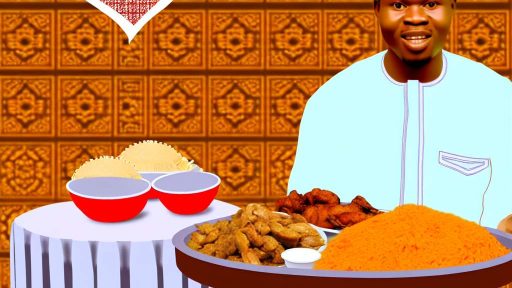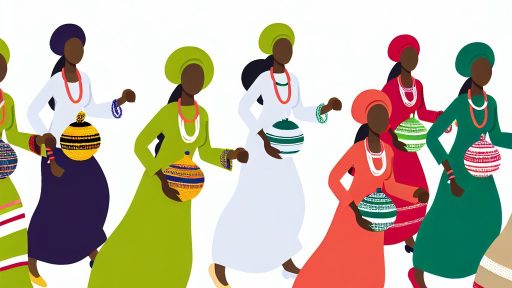Historical Significance of Marriage in Nigeria’s Cultural Fabric
Foundation of Family and Community
Marriage serves as a cornerstone of family life in Nigeria.
It strengthens community ties and fosters social bonds.
Additionally, it creates a supportive structure for raising children.
Married couples contribute to the social and economic stability of communities.
Traditions and Rituals
Each culture within Nigeria has its unique marriage rites.
These traditions often reflect the values and history of the people.
During weddings, communities come together to celebrate.
These celebrations involve music, dance, and vibrant attire.
Economic Impact
Marriage brings about significant economic activities.
Weddings often require elaborate planning and expenditure.
This spending supports local businesses and artisans.
Moreover, marriage markets create job opportunities within communities.
Cultural Identity and Continuity
Marriage plays a key role in preserving cultural identity.
It ensures that traditions and customs are passed down generations.
Couples often incorporate cultural rites into their ceremonies.
This practice reinforces collective memory and belonging.
Social Status and Legitimacy
Marriage often enhances one’s social standing in Nigeria.
It signifies maturity and responsibility in the eyes of society.
Moreover, being married can influence decisions and opportunities.
An individual’s marital status can affect respect and acceptance within the community.
The Role of Marriage in Strengthening Community Bonds and Relationships
Celebration of Unity
Marriage symbolizes unity within Nigerian communities.
It brings together families and friends for joyous celebrations.
These events serve as a reminder of collective identity.
Moreover, they foster a sense of belonging for all participants.
Cultural Significance
Nigerian weddings are rich in cultural traditions.
Each ethnic group showcases unique customs during ceremonies.
These traditions celebrate heritage and promote cultural pride.
Consequently, community bonds strengthen through shared experiences.
Community Support
Marriage ceremonies often involve extensive community participation.
Neighbors and friends contribute in various meaningful ways.
This collaboration symbolizes communal support and unity.
Furthermore, it reinforces trust and mutual respect within the community.
Social Networking
Weddings provide an opportunity for social networking.
Attendees meet new people and build relationships.
These interactions lead to lasting friendships and connections.
As a result, marriage enhances interpersonal relationships within the community.
Economic Impact
Wedding celebrations also stimulate local economies.
Local vendors benefit from increased business during these events.
This economic activity supports community development and growth.
Consequently, marriage becomes a catalyst for economic engagement.
Emotional Connection
Marriage ceremonies strengthen emotional ties among community members.
The shared joy of the occasion brings people closer together.
Moreover, it fosters a collective sense of happiness and celebration.
This emotional connection enriches community life and harmony.
Marriage as a Rite of Passage
Marriage holds significant importance in the Nigerian community.
It serves as a crucial rite of passage for individuals.
Typically, becoming married elevates one’s social status.
Society views married individuals with greater respect and acknowledgment.
Furthermore, marriage signifies the transition to adulthood.
This transition brings responsibilities and expectations from the community.
Transitioning into Adulthood
Young adults undergo a transformation when they marry.
This event often marks the end of their youth phase.
The community celebrates this milestone with various traditions.
Each culture within Nigeria has unique wedding rites.
For instance, the Yoruba celebrate with elaborate ceremonies.
On the other hand, the Igbo community focuses on family involvement.
Social Status Implications
Married individuals often experience heightened social status.
This status can open doors to new opportunities.
Marriage is often linked to wealth and prosperity in many communities.
In addition, married couples receive more respect from peers.
Parents and elders regard them as role models for younger generations.
Community Celebrations
Weddings become grand celebrations for families and friends.
They bring together entire communities for festivities.
Such celebrations foster unity among community members.
Moreover, they reinforce cultural values and traditions.
Ultimately, marriage acts as a catalyst for community bonding.
See Related Content: How Nigerian Culture Influences Gender Roles in Marriage
The Impact of Traditional Marriage Practices on Modern Celebrations
Preserving Cultural Heritage
Traditional marriage practices play a vital role in preserving Nigerian cultural heritage.
These practices connect generations in meaningful ways.
Families often showcase cultural symbols during weddings.
For instance, attire and rituals reflect rich histories.
By embracing these traditions, communities remain anchored to their identities.
Fostering Community Bonds
Marriage ceremonies serve as a gathering point for communities.
They reinforce social ties through collective celebrations.
Guests participate in rituals that strengthen relationships.
Moreover, shared experiences create lasting memories.
In essence, these events unite families and friends.
Influencing Modern Celebrations
Modern Nigerian weddings often blend traditional customs with contemporary styles.
Couples today may incorporate traditional dances and music into their celebrations.
This fusion enhances the uniqueness of each event.
Furthermore, it attracts younger generations to participate actively.
Consequently, traditional practices continue to thrive in modern contexts.
Economic Impact on Local Communities
Weddings can significantly boost local economies.
Vendors, such as caterers and decorators, benefit immensely from events.
This financial influx supports small businesses and local artisans.
Furthermore, communities often rally around celebratory events.
This solidarity fosters a sense of pride and belonging.
Celebrating Diversity Through Unique Customs
Nigeria’s diverse cultures contribute to various wedding customs.
Each ethnic group brings unique rituals and traditions to celebrations.
This variety enriches the wedding experience for all participants.
Guests gain insight into different cultures during these events.
Ultimately, this diversity promotes inclusivity and understanding among communities.
Uncover the Details: The Role of Culture in Shaping Modern Nigerian Marriages
Marriage Ceremonies as a Means of Cultural Expression and Identity
Cultural Significance of Marriage
Marriage ceremonies in Nigeria are vibrant cultural expressions.
They showcase the rich heritage of various ethnic groups.
Certainly, these events reflect the unique traditions of each community.
Community Participation
In Nigeria, communities actively participate in wedding celebrations.
This participation fosters a sense of belonging among residents.
Families and neighbors often come together to celebrate love.
Rituals and Traditions
Each Nigerian marriage ceremony incorporates specific rituals.
These rituals communicate values and beliefs of the community.
For instance, exchanging gifts symbolizes commitment and respect.
Furthermore, traditional attire enhances the cultural display.
Impact on Social Structure
Marriage ceremonies strengthen social ties within communities.
They create networks of support among families and friends.
Additionally, weddings often serve as a platform for networking.
Modern Influences
In recent years, modern influences have shaped traditional weddings.
Couples blend contemporary styles with cultural customs.
This fusion creates unique ceremonies that reflect individual identities.
However, respecting traditional values remains essential.
Celebration of Unity
Marriage ceremonies celebrate the union of two families.
This unity fosters peace and harmony in the community.
Moreover, these celebrations often involve communal feasting.
Such gatherings reinforce bonds and encourage sharing.
Learn More: How Nigerian Marriage Traditions Reflect Family Values and Heritage

The Contributions of Marriage-Related Festivals to Local Economies
Boosting Local Businesses
Marriage celebrations are vital for local economies in Nigeria.
These events create demand for various goods and services.
Local vendors benefit significantly from increased sales during weddings.
Florists, caterers, and decorators see a surge in their business.
Moreover, hotels and transportation services also thrive during this period.
Creating Job Opportunities
Marriage-related festivities generate numerous job opportunities.
From event planners to musicians, many find employment during these events.
Temporary and freelance workers often gain valuable experience.
This influx of jobs helps reduce local unemployment rates.
Encouraging Cultural Exchange
Marriage festivals foster cultural exchange and tourism.
Visitors from different regions attend these celebrations.
This travel promotes local attractions and cultural heritage.
Furthermore, it encourages artisans to showcase traditional crafts.
Enhancing Community Spirit
Wedding celebrations strengthen community bonds.
Families and friends gather to celebrate love and unity.
This collective experience fosters deeper interpersonal connections.
Additionally, it promotes the sharing of cultural values and traditions.
Financial Contributions to the Community
Marriage ceremonies often involve significant financial investments.
Families spend on various aspects such as venues and catering.
These expenditures contribute to the local economy’s growth.
Moreover, a portion of the funds circulates back into the community.
Explore Further: Deep Dive into Nigerian Marriage Cultural Practices
Comparison of Marriage Customs Across Nigeria’s Diverse Ethnic Groups
Coefficients of Traditional Nigerian Marriages
Marriage serves as a cornerstone in many Nigerian communities.
This institution varies significantly across different ethnic groups.
For instance, the Yoruba people emphasize elaborate engagement ceremonies.
These events are crucial for demonstrating the union’s sincerity and legitimacy.
In contrast, the Ibo ethnic group often focuses on bride price negotiations.
These discussions can take several forms, indicating the family’s wealth and status.
Moreover, the Hausa community tends to favor large gatherings and celebrations.
Weddings often include traditional music, dances, and feasting.
Rituals and Practices
Each ethnic group has unique rituals that mark the marriage journey.
The Efik people, for instance, conduct the “introduction” ceremony.
This event allows families to meet and discuss marriage intentions.
Additionally, the Tiv often prescribe cultural rites after the marriage ceremony.
They believe these practices strengthen family bonds and community ties.
Furthermore, the Kanuri people highlight the importance of prayer in their marriages.
They often seek blessings from religious leaders to create a sacred union.
The Role of Community in Marriages
Community involvement plays a crucial role in Nigerian marriages.
For many ethnic groups, weddings are collective events that unite families.
The families of the couple typically invite extended relatives and friends.
This gathering fosters unity and reinforces cultural values.
For instance, the Nupe celebrate the wedding with traditional feasts lasting for several days.
This practice showcases the family’s hospitality and generosity.
Overall, these ceremonies strengthen communal relationships and traditions.
Modern Influences and Changes
Despite the rich traditions, modern influences are evident in Nigerian marriages.
Many couples now incorporate Western elements into their ceremonies.
This fusion can include contemporary attire and venue choices.
Yet, the core values surrounding union and family still remain intact.
Hence, traditional practices are creatively adapted to modern contexts.
In large cities, destination weddings have become more popular.
These changes continue to reflect the dynamic nature of Nigerian culture.
The Influence of Religion on Marriage Celebrations in Nigerian Communities
Religious Significance in Marriage
Religion plays a vital role in Nigerian marriage celebrations.
For many, it serves as a foundation for the entire ceremony.
Various religious beliefs influence customs and traditions.
For instance, Christian weddings often follow specific liturgical practices.
In contrast, Islamic marriages may emphasize different rites.
Cultural Fusion in Ceremonies
Nigerian communities often blend religious and cultural elements.
This fusion creates unique and vibrant celebrations.
Many couples incorporate traditional rituals alongside religious ceremonies.
Consequently, this highlights the diversity in beliefs and practices.
Community Involvement and Support
Marriage celebrations also foster community involvement.
Religious leaders often play significant roles in officiating ceremonies.
The community comes together to support the newlyweds.
This support reflects in both emotional and financial aspects.
Thus, marriages become communal events, strengthening social bonds.
Rituals and Celebrations
Religious rituals enhance the significance of marriage celebrations.
For example, prayers are common during wedding ceremonies.
These prayers invoke blessings on the couple’s union.
Additionally, communities often hold large receptions following ceremonies.
This further deepens the communal spirit and celebration.
Impact of Religion on Family Dynamics
Religion shapes family expectations regarding marriage.
Many families expect adherence to religious customs in unions.
This often guides discussions during courtship and engagement.
Understanding these expectations is crucial for couples.
Therefore, religious beliefs can influence marital compatibility.
Additional Resources
Exploring Igbo Wedding Traditions: The Sacred Role of the Kola Nut …




